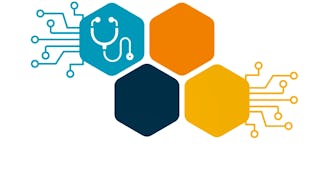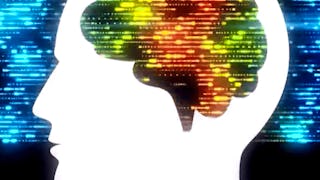Artificial intelligence is transforming healthcare by improving diagnosis, enhancing patient care, and streamlining clinical workflows. If you’re a technologist aiming to apply your skills to healthcare challenges, or a healthcare professional eager to understand and shape the AI tools you’ll work with, this course is for you.

Enjoy unlimited growth with a year of Coursera Plus for $199 (regularly $399). Save now.

Foundations of AI in Healthcare
This course is part of Artificial Intelligence for Healthcare Specialization


Instructors: Ramesh Sannareddy
Included with
Recommended experience
What you'll learn
Describe how AI and machine learning are transforming healthcare delivery, clinical workflows, and patient outcomes.
Explain ethical frameworks, regulations, and governance standards relevant to AI in healthcare.
Summarize common challenges and solutions related to bias, privacy, and integration in AI healthcare implementation.
Design and implement machine learning workflows tailored to healthcare datasets and requirements.
Skills you'll gain
Details to know

Add to your LinkedIn profile
November 2025
13 assignments
See how employees at top companies are mastering in-demand skills

Build your subject-matter expertise
- Learn new concepts from industry experts
- Gain a foundational understanding of a subject or tool
- Develop job-relevant skills with hands-on projects
- Earn a shareable career certificate

There are 4 modules in this course
In this module, you will learn about the basics of artificial intelligence in healthcare. The module begins with tracing the historical evolution of AI, followed by machine learning concepts and how these technologies are transforming clinical workflows across diagnosis, treatment, and patient care. Through real-world examples, you will learn how AI is being integrated into healthcare. You will gain insights into the opportunities and limitations presented by this integration. The module concludes with a forward-looking discussion on the challenges, innovations, and future trends in AI-driven healthcare, preparing you to think critically about the role of AI in modern medical practice.
What's included
7 videos1 reading4 assignments6 plugins
This module addresses the ethical, legal, and regulatory dimensions of AI implementation in healthcare settings. Students will examine fundamental ethical principles, including autonomy, beneficence, and justice, as they apply to AI-assisted medical decision-making and patient care. The module provides comprehensive coverage of bias detection and mitigation strategies, helping students understand how algorithmic fairness impacts health equity and patient outcomes across diverse populations. Students will explore privacy-preserving AI technologies and cybersecurity frameworks essential for protecting sensitive health information in AI systems. The module also covers the global regulatory landscape, including FDA guidance and international standards, while providing practical frameworks for establishing AI governance and risk management processes within healthcare organizations.
What's included
6 videos1 reading4 assignments1 ungraded lab5 plugins
This hands-on module provides students with practical skills for developing and implementing machine learning solutions in healthcare environments. Students will master the complete ML workflow from problem definition to model development, with special emphasis on healthcare-specific considerations such as regulatory compliance and clinical validation requirements. The module covers both supervised and unsupervised learning techniques through real-world medical applications, including diagnostic prediction, patient segmentation, and clinical outcome forecasting. Students will learn advanced feature engineering techniques for medical data. The module concludes with practical guidance on integrating ML models into clinical decision support systems, addressing implementation barriers, and measuring clinical impact in real healthcare settings.
What's included
6 videos1 reading4 assignments1 ungraded lab4 plugins
This final module consolidates the knowledge gained throughout the course and guides learners through a comprehensive, hands-on application of AI in a healthcare scenario. Learners will revisit key concepts, engage in a case-based project or lab, and demonstrate their understanding through practical problem-solving. The module also includes a final assessment and offers reflection activities to help learners identify future learning pathways and career opportunities in healthcare AI. Emphasis is placed on real-world relevance, ethical practice, and readiness for continued specialization. This capstone experience reinforces both conceptual mastery and practical competence.
What's included
1 video2 readings1 assignment1 peer review1 discussion prompt2 plugins
Earn a career certificate
Add this credential to your LinkedIn profile, resume, or CV. Share it on social media and in your performance review.
Offered by
Explore more from Machine Learning
 Status: Free Trial
Status: Free Trial Status: Preview
Status: PreviewAI CERTs
 Status: Free Trial
Status: Free TrialUniversity of Colorado System

Cleveland Clinic
Why people choose Coursera for their career




Frequently asked questions
Yes! You'll work with two guided labs: one on detecting bias in healthcare data using realistic datasets, and another on predicting diabetes with the real Pima Indians Diabetes Dataset. The code is provided for you to review and run, so you can see how AI models are applied in real healthcare contexts.
No extensive coding knowledge required. The labs use pre-written Python code in Jupyter Notebook that you'll review and run to understand how healthcare AI models are built, trained, and tested. The focus is on understanding the process, not writing code from scratch.
The course emphasizes responsible AI throughout. You'll explore real examples of bias detection, fairness, and privacy considerations, and learn how ethical principles guide AI model development and deployment in clinical settings.
More questions
Financial aid available,





